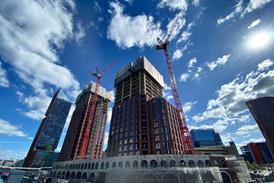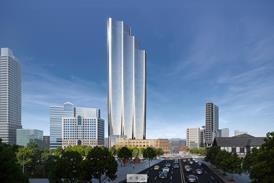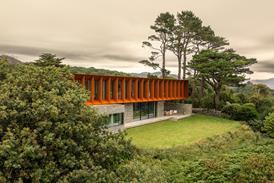If ministers had listened to developers – let alone architects – we’d be in less of a mess now, writes Julia Park

It’s difficult to know where to start with “build build build” – a mantra facile enough to be worthy of Trump. The next raft of permitted development rights (PDR) is being enshrined in law even as you read this. Forced through at lightning speed – either in an effort to impress us, or in the hope that we barely notice. Both, perhaps, depending on which side of the fence you sit.
I’m not sure which will be worst: the top boxes soon to be perched on the roofs of “detached blocks of flats”; the new housing that will systematically replace the office blocks that haven’t already been converted; the crude extra storeys on existing homes; or the net curtains and wheelie bins that will appear at random along our high streets as shops are converted to housing with little or no control over where or how.
Whatever you feel about PDR, it is inexcusable that the government has failed to publish the independent, publicly funded report on the outcomes of the office-to-residential conversions that have taken place in the seven years since the policy was introduced.
Even Ben Clifford, the thoughtful academic responsible for the report, is angry that it hasn’t been published ahead of the next round of reforms. The only logical explanation is that the new team in Number 10, who seem to have a pathological loathing for the planning system, don’t like what it says.
As a historian, Boris should know that deregulation rarely improves anything, and has never led to better housing. Commentators have compared the effects of the pandemic to the two world wars. The most notable difference with covid-19 is the lack of ambition to do better.
Ironically, the importance of good housing has never been more evident. Lockdown has been difficult for all of us but so much worse for those trapped in small homes without even a balcony.
The prime minister’s speech and the official press release have been short on detail, but the commitment to speed feels much stronger than any commitment to quality. An earlier announcement by the new housing minister, Christopher Pincher, on June 25, was more positive: “…the government would be very clear that we expect homes delivered under PDR to be quality homes. I know that hasn’t always been the case, but we want all homes to be built to the highest standards…”
The only detail we know so far is that every habitable room in new homes will soon be required to have a window; in itself a remarkable admission of failure from one of the richest nations in the world.
As a historian, Boris should know that deregulation rarely improves anything, and has never led to better housing
Housing is, of course, only one component of what’s been on everyone’s mind this year, but it’s always been a barometer of a nation’s status; a proxy for where “ordinary people” fit in the hierarchy of priorities and how equal society really is. Covid-19 has proved that for most people, their home ranks third after family and health – and, of course, the three are related. Radio 4’s Rethink series has tapped into a widespread desire not to return to business as usual, but to a better, more caring and more meaningful future. Build build build feels rushed, poorly timed, undemocratic and out of step with the public mood.
Boris also misunderstands developers. The 2012-15 Housing Standards Review, another deregulatory frenzy, was eventually subject to “one in: three out” (for every £1 you spend on new regulation, you must save £3 somewhere else). Almost all of the developers who participated in the workshops said repeatedly that they were willing to do better but needed the level playing field that regulation creates.
A candid admission that, for the most part, they are hard-wired to maximise profit: if something is optional, or subject to negotiation, they will push back and take the cheapest route. But they were clear it doesn’t have to be like that. Subject to a decent lead-in period before new rules kick in – time to gear up and adapt their portfolios of standard house types, and for the cost to come out of land value – they would come quietly.
It was too much for the civil servants to take in, let alone ministers. As you’ll know, the result was a few new bits of regulation, a package of “optional requirements” for accessibility and water in other parts of the Regs, and an optional space standard that is floating around on its own, despite being essential to the proper application of Category 2 of Part M.
Energy fell out of the review because of a long-standing political commitment to require all new homes to be zero-carbon by 2016 – a promise that was broken within six months. The Code for Sustainable Homes had its flaws, but as well as a huge step back in terms of energy efficiency and carbon emissions, its withdrawal meant the loss of the home office space.
The developers felt it would take five years for a decent programme of improvement to be fully embedded. That was exactly five years ago. We would have been there by now, were it not for the arrogance of ministers.
If we must tolerate facile soundbites, “plan design build” would at least have demonstrated some understanding of what needs to happen and in what order. If Number 10 spent more time listening to people and less time covering its own back it would realise it needs to take a different path and raise its housing ambitions to match those of the electorate.
>> Also read: Allford: My answer to ‘Build build build’? Design design design
>> Also read: Architects greet PM’s plans to rip up planning rules with ‘extreme concern’
There are obvious parallels between covid-19 and CO2 emissions too; neither has any respect for political parties or artificial borders, and neither can be kept under control without inspiring leadership, investment and corporate and personal responsibility.
Let’s not look back after another five years, and another 10,000 new homes, and have to admit that we’ve barely stood still. With climate change at tipping point, an ageing society and increasing poverty staring us in the face, when is the time to do better, if not now?
>> Simone de Gale: Architects need to embrace the reality of permitted development
Postscript
Julia Park is Building Design’s housing columnist and head of housing research at Levitt Bernstein
















5 Readers' comments